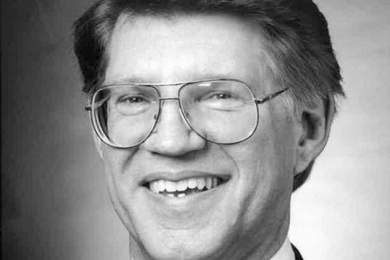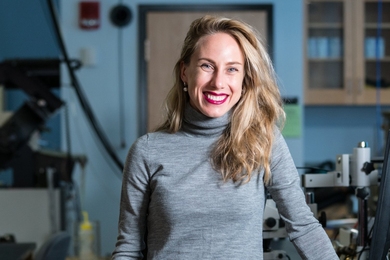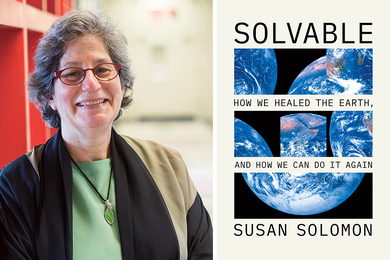In receiving their honors as MIT's newest MacVicar Faculty Fellows last week, the five recipients were as excited and grateful as the students they've taught.
This year's Fellows, announced by Provost Robert Brown, are David L. Darmofal, the Charles Stark Draper Associate Professor of Aeronautics and Astronautics; Jean E. Jackson, professor and section head of anthropology; Professor David Jerison of mathematics; Associate Professor Steven B. Leeb of electrical engineering and computer science; and Associate Professor Anne E.C. McCants of history.
The fellowships were established in 1992 to honor the life and contributions of Margaret MacVicar (S.B. 1964, Sc.D.), MIT's first dean for undergraduate education and founder of UROP (the Undergraduate Research Opportunities Program). The MacVicar Faculty Fellows program provides an annual scholar's allowance to assist each Fellow in developing ways to enrich the undergraduate learning experience. Fellows serve 10-year terms.
Members of MacVicar's family, as well as Corporation members and previously named Fellows, attended Friday's ceremony at the Faculty Club, which was followed by a talk on "The Interface between Teaching and Mentoring: Six Lessons From Up the River" by Professor Richard J. Light of Harvard University's Kennedy School of Government and Graduate School of Education.
Darmofal was recognized, among other things, for his skill in teaching 16.100 (Aerodynamics), which has become the most popular course in aero/astro even though it's an elective. Such was the bond he forged with his students that one of them was moved to write, "I wanted to do well in his class because I didn't want to let him down." Another wrote, "Professor Darmofal has served as a role model for me in my pursuits of a career, and as a friend."
" I hope to continue this emphasis on undergraduate education in the coming years, to help spread the word about the things we're doing here and improve undergraduate education throughout the country," Darmofal said on Friday.
In her turn at the podium, Jackson said she was "completely bowled over" by being named a MacVicar Fellow, adding that she wanted to take advantage of the opportunity to "make a pitch for SHASS" (the School of Humanities, Arts and Social Sciences).
In the past, Jackson said, some bright students were reluctant to come to MIT because they mistakenly thought they wouldn't receive a "full education" in areas such as music, political science, anthropology, literature or history in addition to MIT's renowned strengths in science and engineering. "We need to get the word out and make this an even more wonderful place," she said.
" Professor Jackson really is one of those rare professors in universities that every student wants. Her class, as well as interacting with her, were part of the reason I decided to double major in anthropology as well as physics," one of her students wrote.
In introducing Jerison, Brown praised the mathematics professor for his work in revamping 18.01 and 18.02. "Students rave about his teaching, and this is not an easy achievement in calculus," Brown said to laughter. A student wrote that Jerison "is one of the foremost lecturers of the freshman core classes. His style stands above the rest as he strives to make 18.02 an exciting, enjoyable and worthwhile experience."
Jerison deflected praise onto Professor Arthur Mattuck and MacVicar herself, who once told him that if even 5 percent of her innovations were successful, she'd be happy. "You can't move this giant aircraft carrier very fast," he said of the sizable mathematics curriculum at MIT, "but you can tinker with that 5 percent, and it's a tremendous amount of fun to do that."
Leeb thanked his own teachers at MIT, where he arrived as a freshman in 1983. "They spent a huge amount of time and energy on me ... buffing off the rough edges to get me to where I am at this point," he said, noting that some of his role models were in attendance at Friday's ceremony. "It's a giddy thing to be in this room with people I admire so much."
Leeb "is an amazingly talented lecturer," one of his students wrote. "Never in my six years at MIT have I ever seen anyone as highly enthused about teaching or as dedicated to it as Steve is. One day, I hope to become a professor myself, and I can only hope that I can be as effective an educator as Professor Leeb."
McCants noted that strangers are often surprised to learn she teaches history at MIT, unaware that the Institute even offers classes in that subject. "The truth of the matter is, I really love teaching here," she said. "I'm grateful that MIT pays me to teach, though it would probably be worth doing even if they didn't. But..." The rest of her sentence was cut off by laughter from the crowd.
" Professor McCants convinced me, a skeptical scientist-in-training, that research in history is a well-grounded and exciting endeavor," one student wrote. Said another, "she is truly a role model for students in her commitment to combining a rich, active professional life with an equally rich and active family life and doing so in a way that was visible to her students."
A version of this article appeared in MIT Tech Talk on March 10, 2004.





